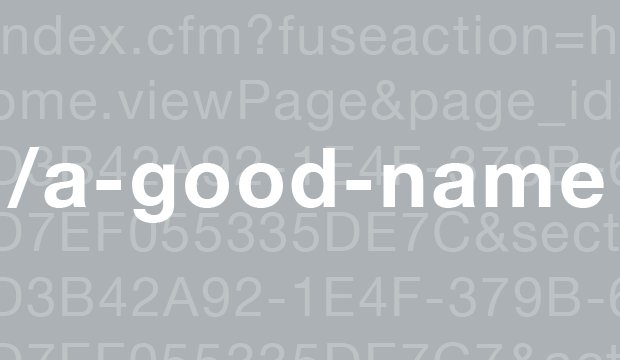What's in a (page)name? An audience for your museum website

You know what Mr. Shakespeare wrote:
A rose by any other name would smell as sweet..."
Unfortunately, no one would be able to google its web page.
If you're involved in your museum's content strategy and content management you're probably already aware that you can improve the search engine ranking of your page by including relevant keywords in its name. For example, if someone's looking for American Gothic they're more likely to find your page in search engine listings if it's named "/collection/paintings/american-gothic/" then if your page is named "index.cfm?fuseaction=home.viewPage&page_id=D3B42A92-1E4F-379B-60D7EF055335DE7C". If not, this post is for you.
The pagename (URL) you choose is an important ingredient in improving your search engine rankings, and being able to name your pages can significantly increase the traffic to your website.
You'll be in a much better position to capture the long tail of web searches for content that can be found on your site. That alone can tack on a significant amount of traffic. When we've installed a content management system for clients to allow relevant naming of pages, it's not unusual to see the number of terms they "get found" for increase as much as 20 percent.
If your facility has a collection, you should give some thought as to how you can feature some of the art on your site on pages you can christen with relevant names. If you are displaying art but using webware that doesn't allow you to control the naming conventions, consider adding a supplemental section to your site where you can have that control.
If you don't have an extensive collection, but your museum is about a historical topic or person, think about how you can name pages in ways that incorporate those terms, increasing the chances that your site content will float to the top of search engine rankings for related keyword searches.
When you're planning a website redesign, selecting a content management system that allows non-technical staff to create unlimited pages and determine the name of those pages should be a basic requirement. Fortunately, the popular Open Source CMSs, Wordpress and Drupal, offer this feature, and others do as well.
A CMS we've developed at plein air, based on the Open Source Django platform, lets museums build landing pages for artists who have produced works that appear in the online collection, as well as pages for specific types of art ("tags") for which people are searching.
These pages are all linked together, and we've seen that this increases digital engagement, increasing time on site as people click back and forth between artists, collection pieces and topics. Bounce rates have gone down and pages-per-vist have gone up, usually dramatically.
One thing to keep in mind, when you embark on a website redesign and move to a CMS that allows you to create search-engine friendly page URLs, is to plan to preserve the ranking of popular pages under the old URL structure. Many of your most popular pages may have inbound links on dozens or even hundreds of other sites; the last thing you want is to serve up the dreaded 404 page ("Page Not Found") because you've adopted a better content strategy for naming your pages.
In that case, you need what's called a "301 redirect" strategy, under which requests for old page names are redirected automatically by your server to the new page name for the content ("index.php?type=about" reroutes to "/about") and it does it in a way that lets the search engine bots know that the page has the same-great-content-with-new-and-improved-name and your rankings - and traffic - won't take a hit.
At plein air we plan for this as part of our redesign process, and you should make sure you understand your interactive partner's 301 redirect strategy before you engage them to rework your site.

